Why Preventive Dental Care Matters for Lifelong Oral Health
Importance of Preventive Care
Preventive dental care, such as brushing twice daily with fluoride toothpaste, flossing, and regular dental checkups, plays a crucial role in maintaining healthy teeth and gums. These habits help remove plaque, prevent cavities, and stop gum disease from developing or worsening.
Impact on Overall Health
Good oral health is closely linked to overall well-being. Conditions like gum disease can increase the risk of serious health issues, including heart disease, stroke, and complications during pregnancy. Managing oral health also benefits those with chronic conditions such as diabetes by improving blood sugar control.
Benefits Across All Ages
From children to older adults, preventive care supports strong, healthy teeth throughout life. For seniors, specialized care addresses challenges like dry mouth and denture care, helping to keep smiles healthy and functional. Starting early and maintaining proper oral hygiene promotes long-lasting oral health for everyone.
Dental Health Key Facts
- Brushing twice daily with fluoride toothpaste strengthens enamel and prevents decay.
- Daily flossing removes plaque from between teeth, significantly reducing gum disease and cavities.
- Visiting the dentist every six months for exams and cleanings aids in early detection of dental issues.
- Using antibacterial mouthwash helps control harmful bacteria and reduce plaque buildup.
- A balanced diet low in sugar and acids protects against enamel erosion and cavities.
- Managing dry mouth through hydration and saliva substitutes is vital for preventing decay.
- Avoiding tobacco and excess alcohol reduces the risk of gum disease and oral cancer.
- Wearing mouthguards during sports protects teeth from trauma and fractures.
- Replace toothbrushes every 3-4 months and use proper technique to ensure effective cleaning.
- Properly caring for dentures and restorations maintains oral health and prolongs their lifespan.
1. Brush Twice Daily with Fluoride Toothpaste
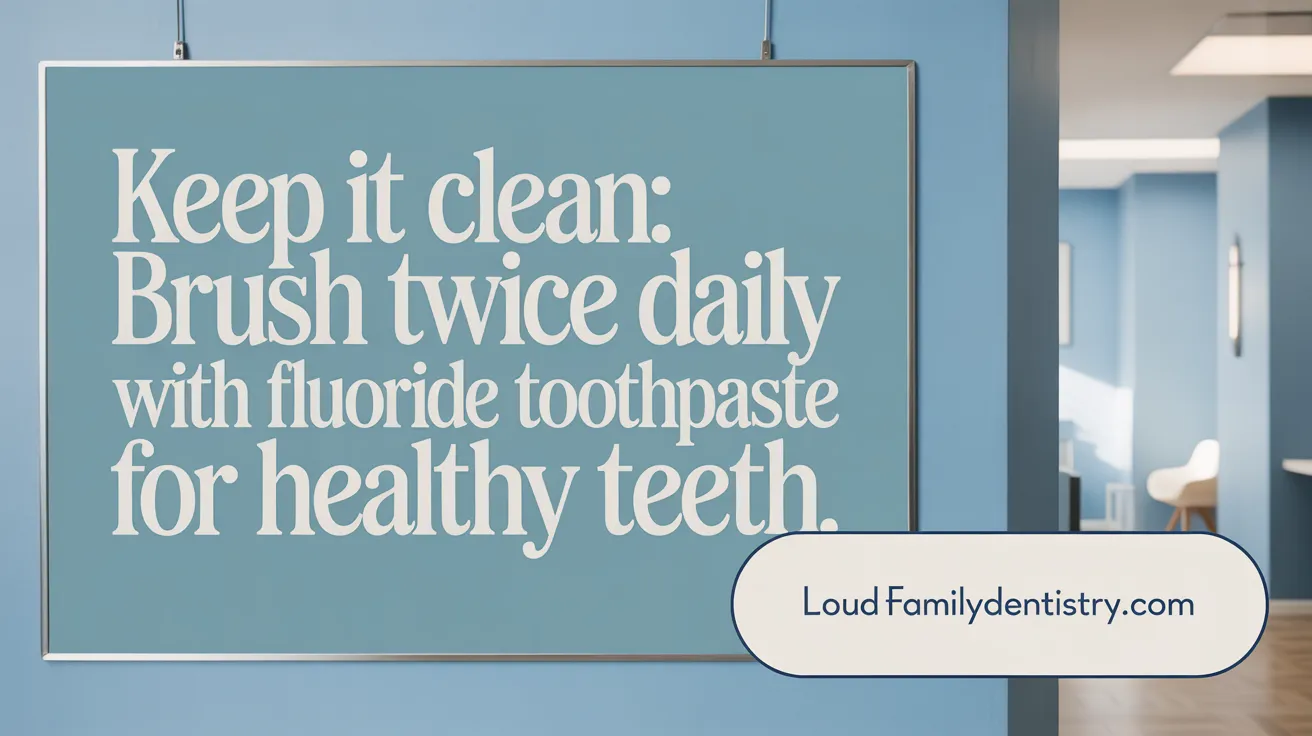
How often should you brush your teeth and what type of toothpaste should be used?
Brushing your teeth at least twice a day using fluoride toothpaste benefits is critical for maintaining healthy teeth and gums. Fluoride strengthens your enamel, the hard outer layer of your teeth, making them more resistant to decay. This practice helps remove plaque—a sticky film of bacteria—that causes cavities and gum disease.
Proper brushing technique involves using a soft-bristled toothbrush use positioned at a 45-degree angle toward the gumline. Use gentle, small circular motions to clean all surfaces of your teeth without damaging your gums. Proper brushing technique for about two minutes ensures thorough cleaning.
Choosing toothpaste with the right fluoride concentration enhances enamel reinforcement and decay prevention. Adults should use toothpaste containing at least 1,350 ppm fluoride. After brushing, avoid rinsing immediately with water to allow fluoride to maintain its protective effects longer. For details, see Brushing teeth with fluoride toothpaste.
Consistently brushing twice daily with fluoride toothpaste for tooth decay supports overall oral health, reduces plaque buildup, and lowers the risk of developing cavities and gum disease.
2. Floss Daily to Remove Plaque Between Teeth
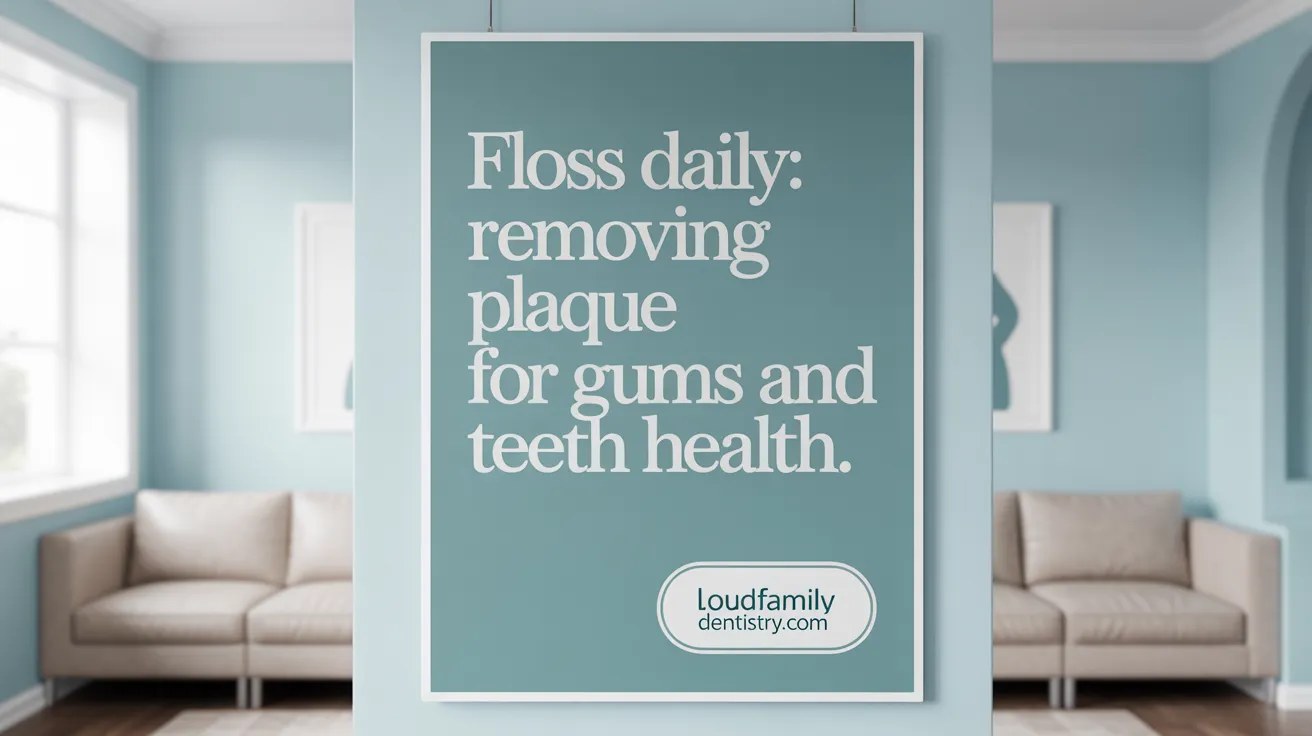
Why is flossing important in dental hygiene?
Flossing daily removes plaque and food particles from between teeth where toothbrushes can’t reach, significantly reducing the risk of gum disease prevention and cavities. Plaque buildup in these tight spaces can lead to gingivitis, an early form of gum disease, which if untreated, may progress to periodontal treatments and cause tooth loss.
How does flossing prevent gingivitis and tooth decay?
By cleaning the interproximal (between teeth) areas, flossing disrupts plaque formation that harbors bacteria. This helps prevent inflammation of the gums and the development of cavities in areas not accessible to brushing. See more on the importance of brushing twice daily and fluoride toothpaste benefits.
What tools can help with interdental cleaning?
While traditional floss is effective, interdental brushes can also be used, especially for people with wider spaces between teeth or braces. These tools allow for thorough removal of plaque, supporting healthier teeth and gums.
Incorporating daily flossing or interdental cleaning into your routine is an essential step toward maintaining good oral health and preventing common dental problems.
3. Schedule Regular Dental Exams and Professional Cleanings
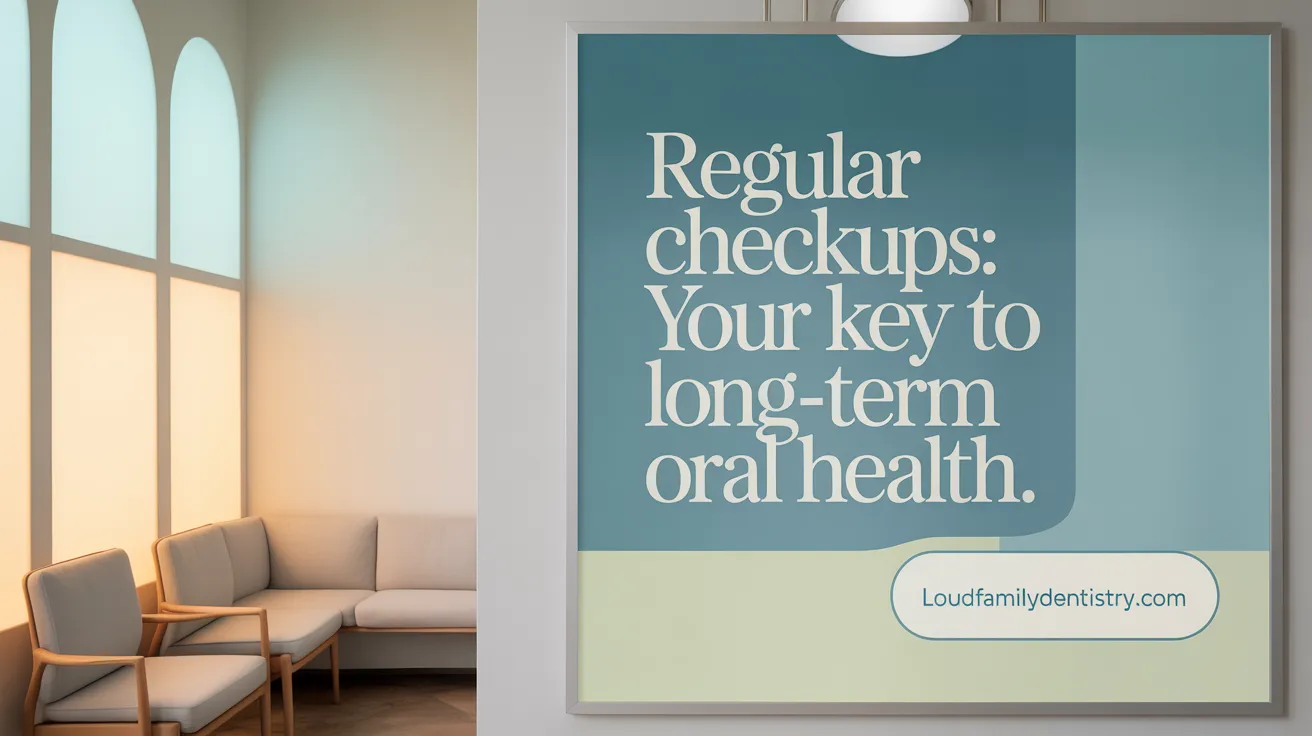
How often should people visit the dentist for preventive care?
Regular dental exams and cleanings every six months are recommended for most individuals. This frequency helps maintain oral health and allows for early identification of any potential issues. However, some people, especially those prone to gum disease prevention or cavities, may require more frequent visits to effectively manage their oral health.
What is the role of professional cleanings in tartar removal?
Professional cleanings performed by dental hygienists are essential because they remove tartar buildup—hardened plaque that cannot be eliminated by brushing or flossing alone. Removing tartar helps prevent the progression of gum disease prevention and tooth decay.
How do routine visits aid early detection of dental problems?
Regular dental checkups allow dentists to detect early signs of cavities, gum disease, oral cancer, and other conditions. Early diagnosis usually means simpler, less invasive, and more cost-effective treatments.
Are recall intervals customized?
Yes, recall intervals for dental visits are tailored to each person’s needs based on their oral health status. Those with specific challenges like periodontal treatments or frequent cavities may need appointments more often than the standard six months.
Scheduling consistent dental visits is a vital part of preventive care, supporting long-term oral health and overall well-being.
4. Use Antibacterial Mouthwash to Control Bacteria
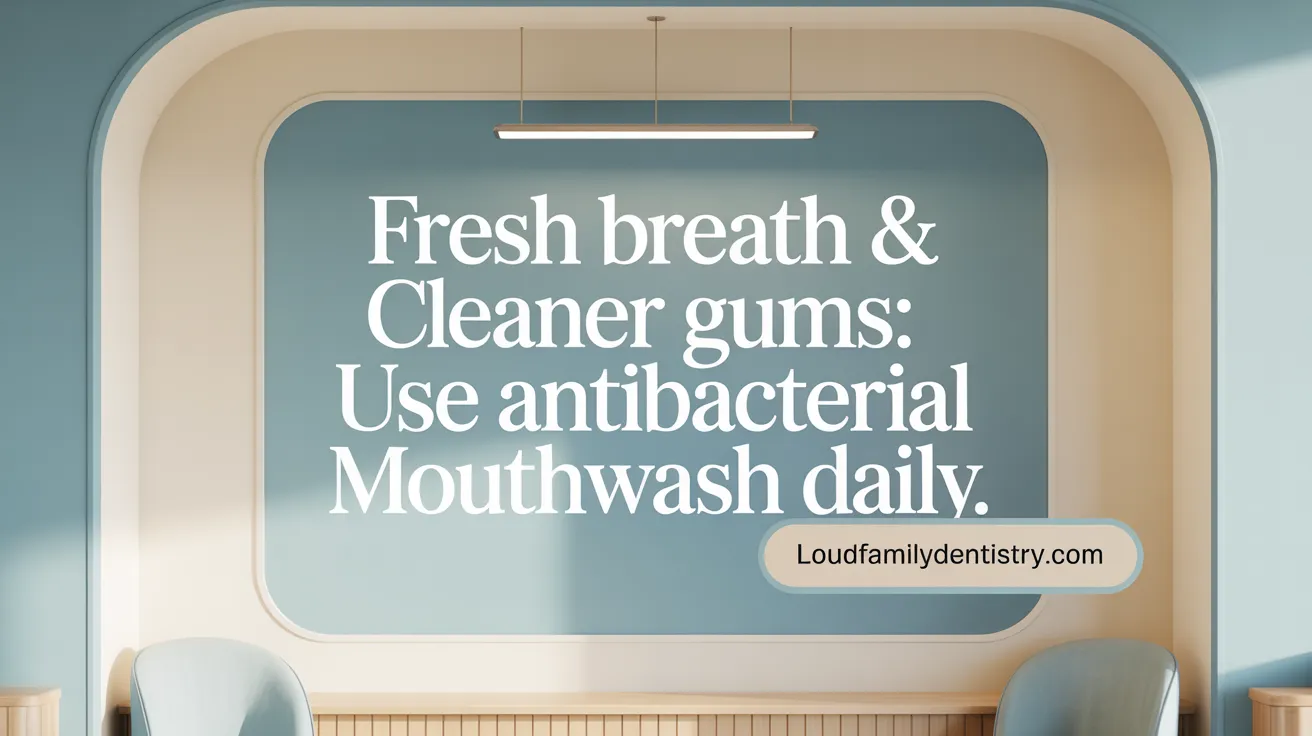
How does mouthwash contribute to oral health?
Antibacterial mouthwash plays an important role in oral hygiene best practices by helping to control harmful bacteria and reduce plaque buildup. When used daily, especially alongside regular brushing and flossing, it enhances your oral hygiene routine by targeting areas where brushing alone might miss.
Choosing an alcohol-free mouthwash formula is often preferred as it minimizes the risk of dry mouth management, a condition that can increase the likelihood of cavities and infections, particularly in older adults or those with sensitive mouths.
In summary, incorporating an antibacterial, alcohol-free mouthwash supports cleaning between teeth and along the gum line, contributing to fresher breath tips, healthier gums, and decreased risk of fluoride toothpaste benefits, gum disease prevention, and tooth decay prevention tips.
5. Maintain a Balanced Diet Low in Sugars and Acidic Foods
How does diet affect dental health?
Your diet has a significant impact on your dental health. Limiting sugary and acidic foods helps prevent enamel erosion and tooth decay. Bacteria in the mouth feed on sugars and produce acids that can wear down the protective enamel layer of your teeth, leading to cavities.
Including foods rich in calcium and vitamin D is important as these nutrients support the strength and repair of tooth enamel and the health of your gums. Calcium is found in dairy products like cheese and yogurt, while vitamin D can be obtained from sunlight exposure and foods like fatty fish.
Healthy snack options such as fruits, vegetables, nuts, and cheese not only provide essential nutrients but also stimulate saliva production, which helps neutralize acids in your mouth and wash away food particles.
Maintaining a well-balanced diet with limited sugar and acidic intake is an effective way to protect your teeth and support overall oral health throughout your life.
6. Stay Hydrated and Manage Dry Mouth
Why is managing dry mouth important for oral health?
Dry mouth, often caused by medications or health conditions, reduces saliva flow, which is vital for neutralizing acids and washing away food particles. This condition significantly raises the risk of tooth decay and oral infections.
Causes and effects of dry mouth
Medications common among older adults and certain health issues can decrease saliva production. Without enough saliva, plaque buildup increases, leading to a higher chance of cavities and gum disease.
Hydration strategies
To combat dry mouth, it’s important to sip water regularly throughout the day. Avoiding alcohol and caffeine, which can further dry the mouth, helps maintain moisture (dry mouth management).
Use of artificial saliva and sugarless gum
Artificial saliva products can provide added moisture and protection for dry mouths. Additionally, chewing sugarless gum stimulates saliva production, aiding in natural defense against decay (dry mouth management.
By incorporating these practices, especially for older adults or those on medications, residents in Shreveport and beyond can better protect their oral health and reduce risks associated with dry mouth.
7. Avoid Tobacco and Limit Alcohol Consumption
How do tobacco and alcohol affect oral health?
Tobacco use plays a major role in increasing the risk of gum disease prevention and oral cancers. Smoking and chewing tobacco expose the mouth to harmful chemicals that damage gum tissues and promote cancerous changes. Similarly, excessive alcohol consumption and head and neck cancers raises the risk of oral and head and neck cancers by irritating the mucous membranes and enhancing the effects of tobacco.
Why is quitting tobacco important?
Quitting tobacco significantly improves oral health by lowering the chances of periodontal treatments progression and reducing cancer risk. It also leads to fresher breath, better healing, and overall improved oral hygiene best practices.
Promoting health through avoidance
Avoiding tobacco products and limiting alcohol intake are vital steps in oral health promotion. These habits not only protect the mouth but also contribute to overall well-being. Dental professionals often emphasize cessation counseling as part of routine care to help patients maintain healthier smiles.
By understanding the detrimental effects of tobacco and alcohol, individuals can make informed choices to safeguard their oral and systemic health.
8. Protect Teeth with Mouthguards During Physical Activities
What role do mouthguards play in dental care?
Wearing mouthguards during sports and grinding or activities that risk dental injury is a critical preventive measure. Mouthguards protect your teeth from trauma by cushioning any impact, which helps prevent fractures, chips, or tooth loss.
Mouthguards to prevent dental injuries
Dental injuries during contact sports or physical activities can be severe, including broken teeth or damage to soft tissues inside the mouth. Using a mouthguard significantly reduces the risk of such injuries by absorbing and distributing the force of a blow.
Importance during contact sports
Contact sports like football, basketball, hockey, and martial arts put participants at high risk of oral injuries. Mouthguards are especially important for players in these sports as they reduce not only dental trauma but also damage to the jaw and surrounding tissues.
Custom-fitted options
For optimal protection and comfort, custom mouthguards in Scottsdale made by dental professionals are recommended. These mouthguards provide a secure fit tailored to your mouth, enhancing protection while allowing for ease of breathing and speaking. Over-the-counter options exist but may not offer the same level of safety or comfort.
Regular use of a well-fitted mouthguard during physical activities is a simple, effective way to maintain oral health and avoid costly dental treatments related to sports injuries.
9. Replace Toothbrushes Regularly and Use Proper Tools
How often should toothbrushes be replaced and what tools aid dental care?
To maintain effective oral hygiene, replace your toothbrush every three to four months or earlier if the bristles become frayed or worn. Using a soft-bristled toothbrush is recommended to gently clean teeth and gums without causing damage. For individuals with limited hand mobility, such as older adults or those with arthritis, electric toothbrushes can make brushing easier and more thorough. Additionally, floss holders are great tools that assist in reaching between teeth when manual flossing is challenging.
Proper brushing technique is equally important: brush twice daily with fluoride toothpaste benefits, holding the brush at a 45-degree angle to the gumline, using gentle circular motions. This approach ensures plaque removal along the gumline, reducing risk of gum disease prevention and decay. Using the right tools combined with good technique helps maintain healthy teeth and gums for a lifetime.
10. Care for Dentures and Dental Restorations Properly
How should dentures and dental restorations be cared for to maintain oral health?
Proper care of dentures care tips and dental restorations options is essential to maintain oral health and ensure they function effectively. Dentures should be cleaned daily using appropriate solutions and handled gently to avoid damage. When first adjusting to new dentures, it is recommended to start with soft foods and chew slowly to allow your mouth to adapt comfortably.
Dental restorations such as crowns, bridges, and implants require professional dental care. Regular check-ups are important to monitor these restorations, preventing complications and ensuring longevity. Your dentist can guide you on personalized care routines and any necessary adjustments.
If you experience any discomfort or notice changes in your dentures or restorations, consulting your dentist promptly can prevent further issues.
Maintaining good hygiene and seeking professional advice supports overall oral health and helps you enjoy a healthy, confident smile.
Comprehensive Dental Services at Loud Family Dental
What types of dental services does Loud Family Dental offer?
Loud Family Dental in Shreveport, Louisiana, offers a broad spectrum of dental services designed to meet the needs of patients of all ages. Their services encompass routine preventive dental care such as dental exams, cleanings, and X-rays, which play a vital role in maintaining oral health and early detection of issues.
In addition to prevention, Loud Family Dental provides restorative treatments including fillings, crowns, and bridges to repair damaged or missing teeth. Cosmetic dentistry options such as teeth whitening and veneers are also available, helping patients achieve a more attractive smile.
Specialized treatments cater to children through pediatric dentistry and also include orthodontic care for aligning teeth and improving bite function. This comprehensive approach ensures that every family member receives the appropriate dental care for their age and unique needs.
By offering preventive, restorative, and cosmetic services under one roof, Loud Family Dental supports a lifetime of oral health in Shreveport.
How Loud Family Dental Ensures Patient Comfort
How does Loud Family Dental emphasize patient comfort during treatments?
Loud Family Dental prioritizes patient comfort by fostering a welcoming and calming environment from the moment patients enter. Their team uses gentle techniques specifically designed to reduce discomfort during procedures. For children and families, they adopt friendly communication styles that help alleviate anxiety and build trust.
To further enhance comfort, the dental office provides distraction tools such as tablets and books, helping patients focus away from the treatment. Relaxation techniques are encouraged, allowing patients to feel more at ease. Patients are also invited to share any fears or concerns, ensuring personalized care that respects their comfort needs.
These approaches combine to create a supportive dental experience where patients of all ages feel safe and relaxed throughout their visit.
Suitability of Loud Family Dental for Families and Elderly Patients
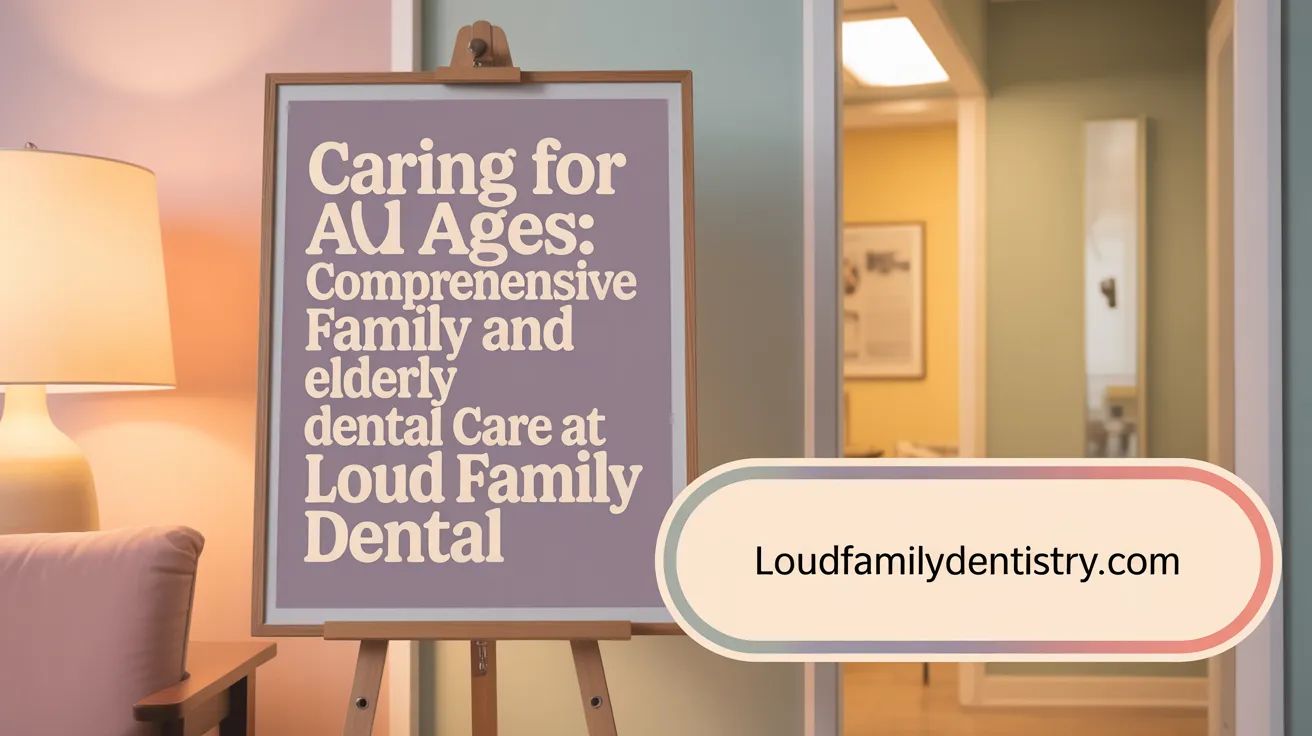
Is Loud Family Dental suitable for families with children and elderly patients?
Yes, Loud Family Dental is well-equipped to serve patients of all ages, making it an excellent choice for families and elderly individuals in Shreveport.
Age-Inclusive Dental Care
The clinic understands the unique dental needs that arise at different life stages. For children, Loud Family Dental provides fluoride treatments and sealants for children that effectively prevent cavities, especially in hard-to-clean regions. For elderly patients, the clinic offers tailored periodontal care addressing challenges like gum disease prevention and dry mouth management, common with aging.
Fluoride Treatments and Sealants for Children
Loud Family Dental emphasizes preventive care for younger patients by applying fluoride toothpaste and sealants to protect developing teeth from decay. These treatments are crucial for maintaining healthy teeth and encouraging lifelong good oral hygiene best practices.
Specialized Periodontal Care for Seniors
Recognizing that older adults often contend with receding gums, dry mouth from medications, and potential tooth loss, Loud Family Dental provides comprehensive periodontal treatments. These include routine cleanings, management of gum disease, and advice on dentures care tips, supporting seniors to maintain their oral health and comfort.
Modern Facilities and Technology
The clinic boasts modern dental technology and a comfortable environment, facilitating effective diagnosis and treatment for all age groups. This includes proper dental cleaning techniques suited for those with limited hand mobility, ensuring patient comfort and optimal care outcomes.
Loud Family Dental’s comprehensive services cater well to the diverse needs of families and elderly patients, promoting healthy smiles across generations.
Commit to Preventive Dental Care for a Lifetime of Healthy Smiles
Essential Preventive Dental Care Tips
Maintaining a healthy smile starts with simple daily habits. Brush your teeth twice a day using fluoride toothpaste and a soft-bristled toothbrush angled gently toward your gums. Floss daily to clean between teeth where brushing can’t reach, and consider brushing your tongue to reduce bacteria and freshen breath. Limiting sugary snacks and drinks, drinking fluoridated water, and avoiding tobacco help protect your teeth and gums from decay and disease.
The Importance of Regular Dental Visits
Routine dental exams every six months enable early detection of cavities, gum disease, and oral cancer. Professional cleanings remove plaque and tartar buildup that home care cannot. For those at higher risk or with existing dental issues, dentists may recommend more frequent visits. These appointments are critical for personalized advice and preventive treatments that keep your mouth healthy.
Making Healthy Dental Habits a Priority
Consistency with brushing, flossing, and regular dental visits builds a strong foundation for lasting oral health. Small changes—like using an electric toothbrush if you have limited dexterity or choosing alcohol-free mouthwash—can enhance your routine. By committing to these habits, you safeguard not only your smile but also your overall health, reducing risks for serious conditions such as gum disease and its links to heart disease and dementia.
